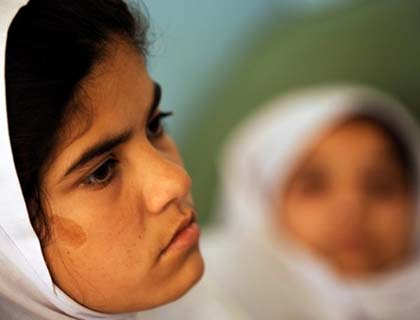Education is an entity that installs rich human values in a person, making him more human friendly and socially amiable. It is not an acquisition of an aptitude to read and write is literacy not education. The last three decades Afghanistan’s education system was steered with ample radicalization. Control of the education system has been a mobilizing force for the conservative and radicalized movement that led to overthrow of the Soviet government and the subsequent rise to power of the Taliban. During the reign of the Taliban the educational system was inclined to produce Mujahedeen. Till date Taliban diverged several Koranic verses for justifying killings of thousands of innocents, prohibiting women from acquiring education, labeling co-education illicit and the modern scientific inventions desecrated, the list goes on and on. There is hardly any sort of condemnation noticed.
Afghanistan’s spending on education is not enough seeing the magnitude of illiteracy. The remedy is to increase the proportion of public resources going into education. If tax-to-GDP ratio cannot be increased, the state should be willing to divert resources from sectors with lower priority towards education. The donor community has been prepared to help with funds when it is not feared that domestic resources were constrained to allow for an increase in public sector expenditure on education.
A glance at our deserted national priorities disheartens us of interminable irrational and abrupt priorities which happens to be mostly influential than inspirational. The undertakings executed under the influence of forged circumstances than national priorities yield not, the desired result based on national interest.
It is right for the world and us to worry about the impact of Afghanistan’s dysfunctional educational system, especially when it has been demonstrated that poorly educated young men in a country as large as Afghanistan pose a serious security threat to the rest of the world. Millions of families, especially those with little money, send their children to religious schools or Madrasas. Many of these schools are the only opportunity available for an education, but some have been used as nurturing ground for violent extremism. There is no doubt that Madrasas need to be reformed, but what is even more critical is the reform of public sector educational systems.
The misleading objective opinion owned, by incumbent rulers deluded them of genuine issues, instead, and is stuck to unfounded motives in seeking the traces of others involved despite owing hundreds of operational departments under their service. Sticking to state of constant denial, owing the responsibility of mishaps undertaken in one’s realm marks an in-depth degree of incompetence whilst negating any expectancy of betterment. Consequently the politician shun in delusion tries not to revisit the gray areas of governance, consequently improvement turned an intangible target given a rational dictum for intellectual and material achievements has never been a pursuable discourse for our politician. Regretfully the efforts are mostly exercised to earn the credit for else good deeds instead of owning and following a clear stance.
There are several ways of assessing the status of an educational system in the developing world. Among the more frequently used indicators are adult literacy rates for both men and women in various parts of the country; enrollment rates for both girls and boys at different levels of education and in different areas of the country; the dropout rates at different levels of education; the number of years boys and girls spend in schools; the amount of resources committed to education as a proportion of the gross domestic product, particularly by the public sector; the amount of money spent on items other than paying for teachers’ salaries; and, finally, some measure of the quality of education provided. However Afghanistan’s record is very poor on all these counts which need immediate remedy.
Poor quality of the instruction should preliminarily be considered. The obvious solution is to invest in teacher training, reforming the curriculum and improving the quality of textbooks that should be deficient of religio-ethnic biases. The high quality and standard of books must be kept on the top priorities. There may be poorly constructed or the buildings may be poorly maintained. The students may not even have chairs and desks where they can sit and work. This problem can be handled, by committing more resources for public sector education.
Afghanistan’s education system requires an almost total overhaul. In the modern world, economic growth and the spread of democracy have raised the value of education and increased the importance of ensuring that all children and adults have access to high quality and effective education. Education promoting the rich human values is increasingly driven by a growing understanding of what works in education and how to go about successfully improving teaching and learning in schools with sufficient resource allocation. Pluralistic education plays an essential role in relation to conflict prevention, resolution, reconciliation and reconstruction. Under these rationales, education should be structured as a non-traditional tool for building security by linking education to the human security framework.
It is high time we have to admit immense worth of education being a versatile tool guaranteeing stability, social cohesion and societal uplift whilst ensuring respect for human rights. Many societal problems get regulated after education stand top most priority. The skinny budget allocated for education ridicules us as a nation and marks deep-rooted state of intellectual bankruptcy. Unless education renders preliminary requisite, success may remain a daydream.
The role of education for the joint uplift of a nation is irrefutably central. The collective socioeconomic and political advances of a nation are determined by the degree of concentration diverted to improve its literacy graph and the amount of resources allocated to this preliminary societal need. A nation reaches to prominence, turn unbeatable and matchless, only when greater intrepid steps are taken to eliminate illiteracy by declaring the state of educational emergency. The profound significance of education in societal ascend is established and undisputed, contrary of being failed to inspire our politicians.

